|
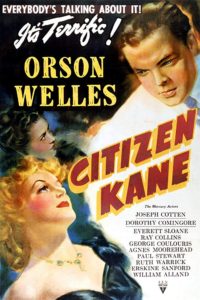
Synopsis:
After the death of an infamously self-absorbed newspaper tycoon named Charles Foster Kane (Orson Welles), a magazine editor (Philip Van Zandt) sends a reporter (William Alland) to investigate the meaning of Kane’s final word (“Rosebud”) by viewing newsreels and interviewing various key players in his life — including Kane’s business manager (Erskine Sanford), his estranged friend (Joseph Cotten), his second wife (Dorothy Comingore), and his butler (Paul Stewart).
|
|
Genres:
- Agnes Moorehead Films
- Flashback Films
- Joseph Cotten Films
- Journalists
- Marital Problems
- Millionaires
- Orson Welles Films
- Paul Stewart Films
- Rise-and-Fall
- Tycoons
Response to Peary’s Review:
Peary argues that “Orson Welles’s debut film can justifiably be called the greatest picture of all time because it not only taught other directors how to tell a story through film but also taught moviegoers how to watch a film”. He writes that the “film is about a search for the essential missing part (‘Rosebud’) needed to document a man’s life”, and notes that Welles “creates ‘realism’ (the ‘true’ picture of Kane) through illusion and expressionism, and so his picture becomes a tribute to the camera”. He adds:
“The visuals show past events not as the six storytellers remember them but as the filmmakers (primarily director Welles and cameraman Gregg Toland) interpret the storytellers’ words… We learn about Kane and the other characters not only through dialogue and action but through Welles’ creative, flamboyant use of props, screen space, set design, music, editing, sound (including voice inflections), costumes, freeze frames, deep-focus photography, and lighting.”
Peary further points out that the “picture has great acting, music (by Bernard Herrmann), photography, editing (by Robert Wise), [and] countless classic moments”.
Peary discusses Citizen Kane not only in his GFTFF but in his first Cult Movies book — where he offers an in-depth overview of the film’s notorious production and release — and Alternate Oscars, where he names it Best Picture of the Year, and refers to it as “stunningly directed, magnificently acted, and brilliantly written”. He argues that while not all would consider it “the greatest film ever made”, it’s “at [the] very least… the most influential film of the sound era, the picture that best illustrates the potential of film as a storytelling medium and as an outlet for personal and artistic expression”. All of Peary’s praise rings true: the film does indeed “astonish” those seeing it for the first time, and “repeated viewings only increase the impact”. Whether one merely admires Citizen Kane or actively enjoys it, there is never a visually dull moment; it’s well worth a look or two (or three, or more).
Notable Performances, Qualities, and Moments:
- Gregg Toland’s legendary cinematography
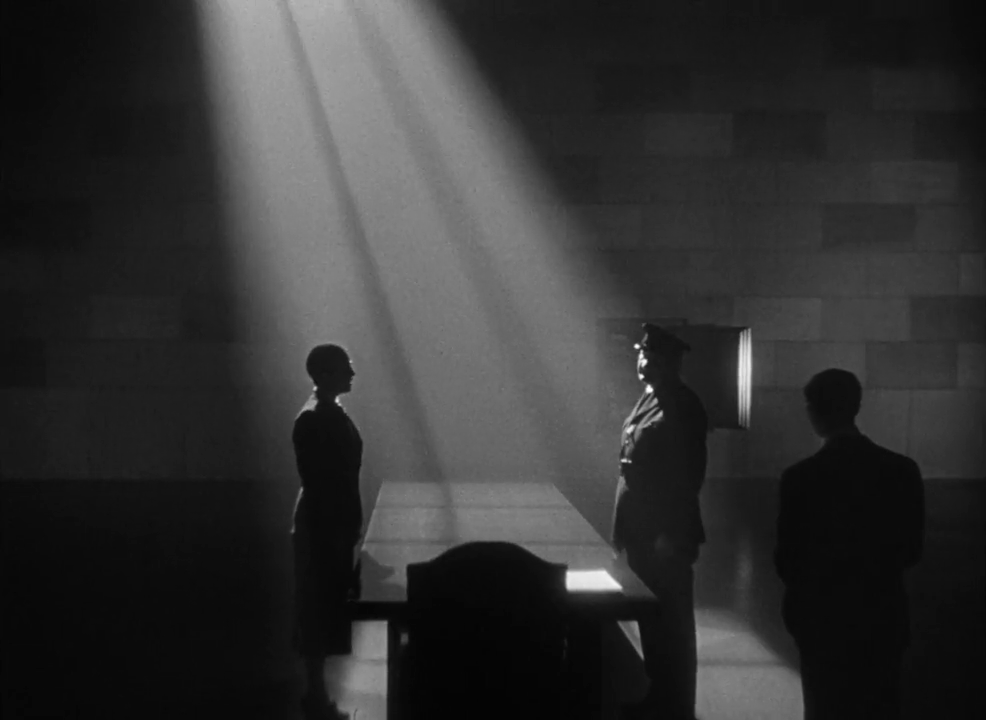
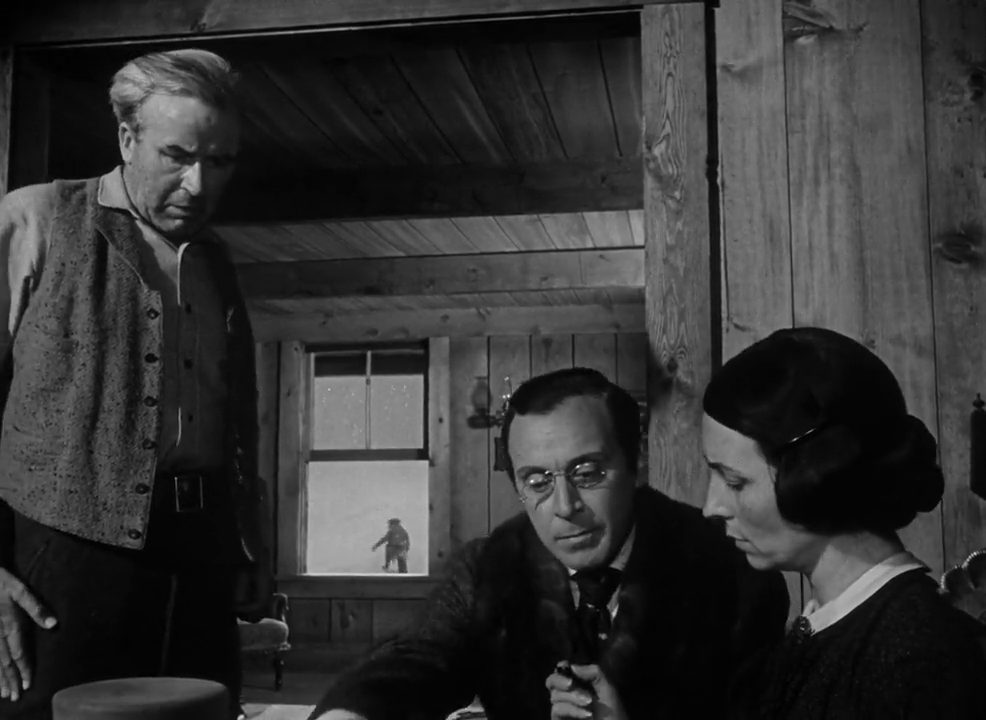
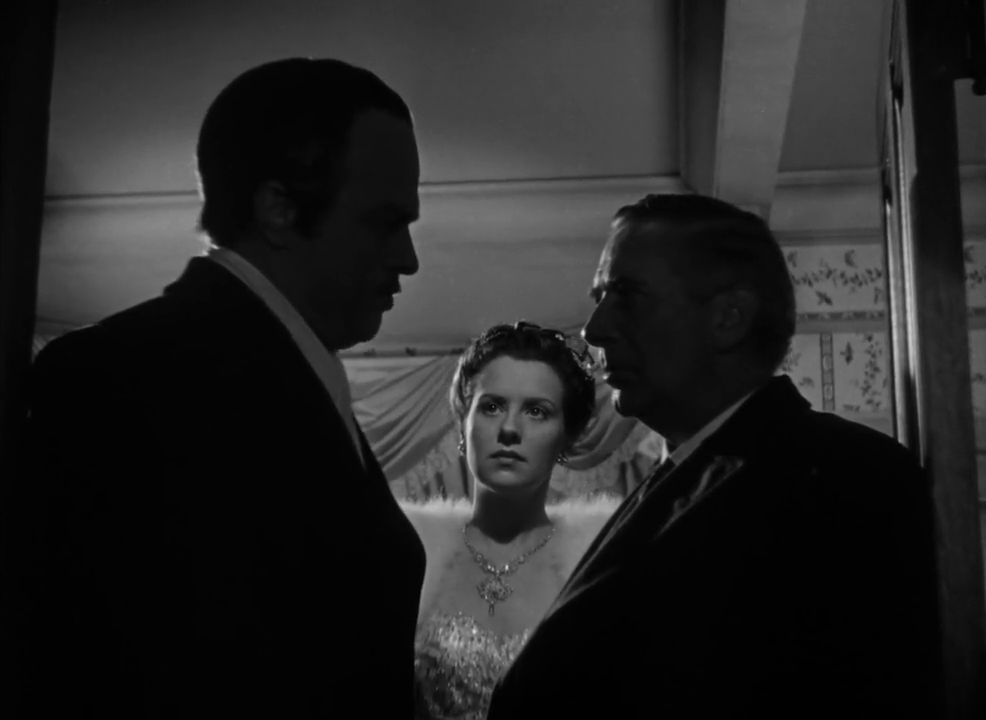
- Excellent use of unusual and diverse sets
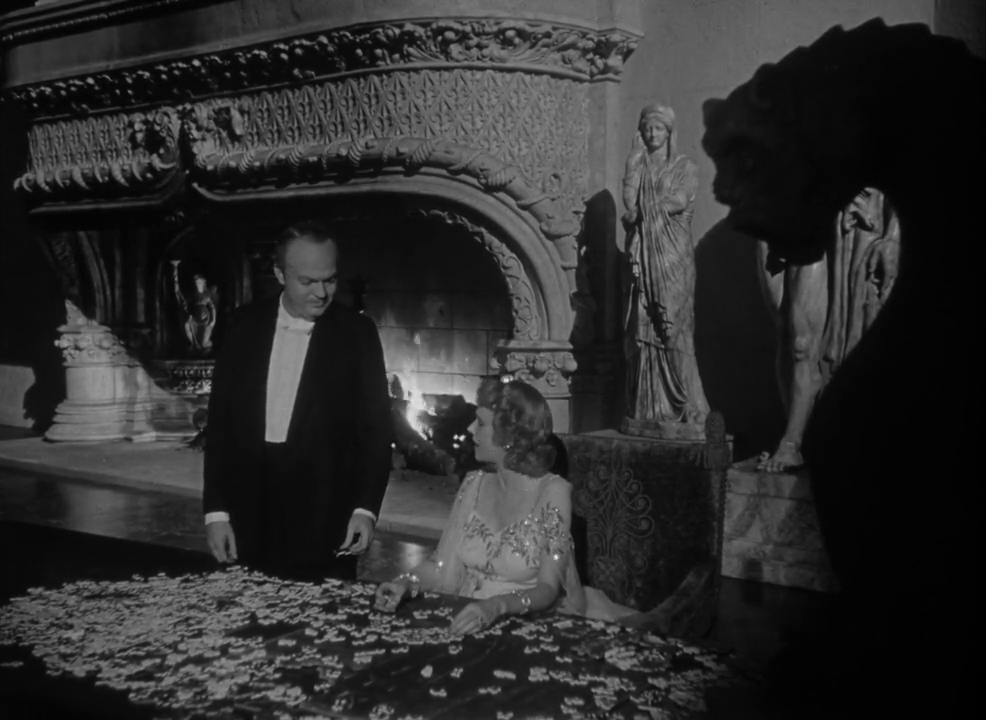
- Many memorable images
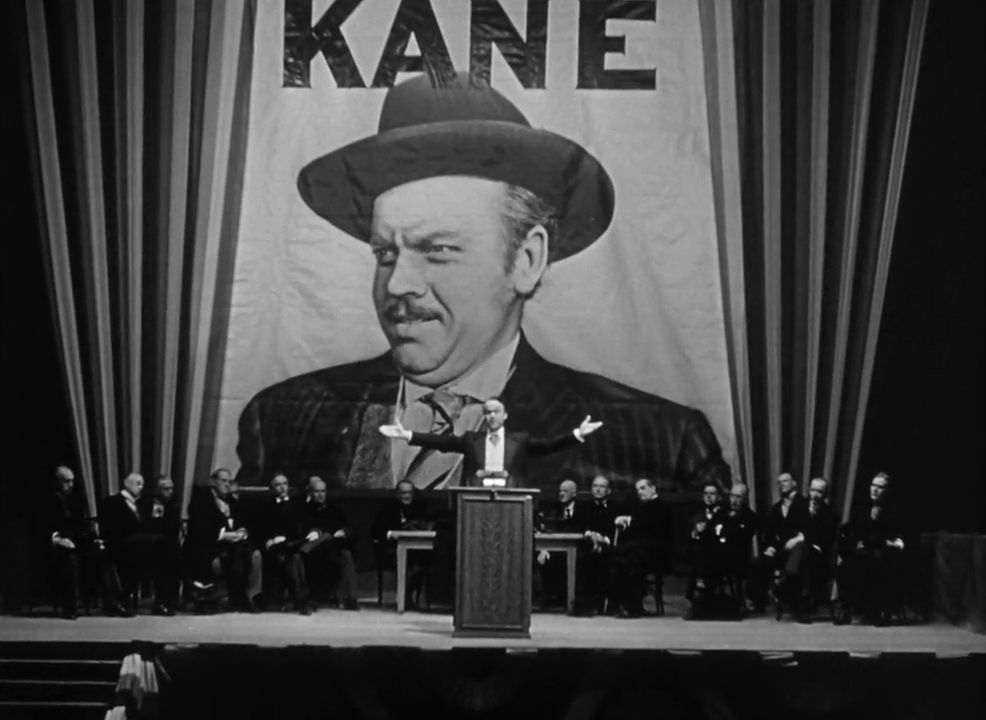
- Orson Welles as Kane (nominated by Peary as one of the Best Actors of the Year in Alternate Oscars)
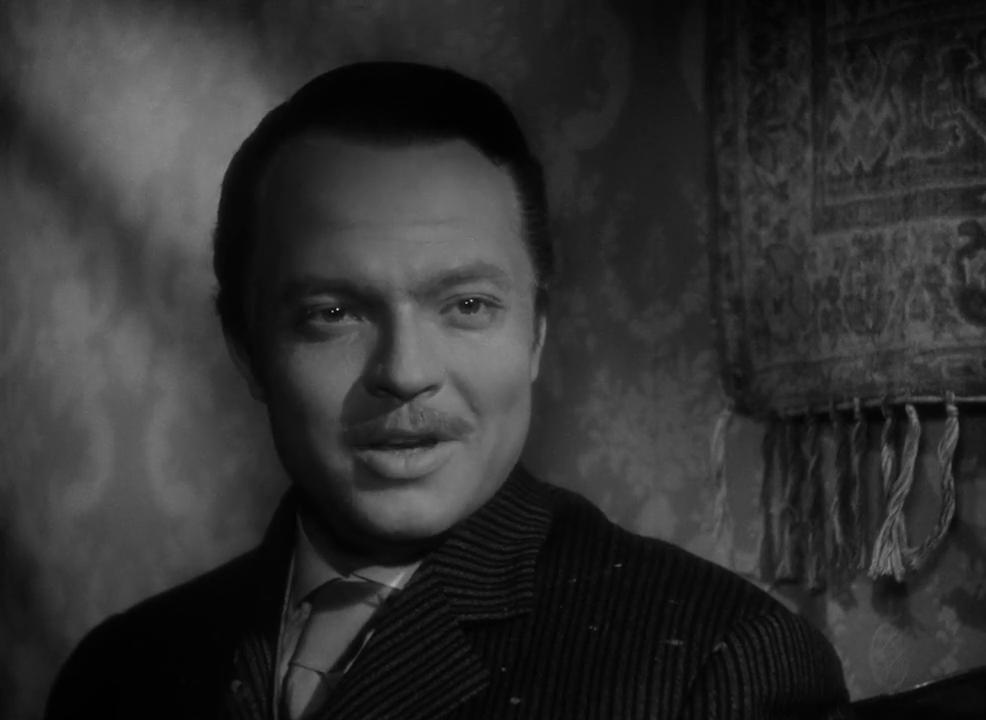
- Fine supporting performances
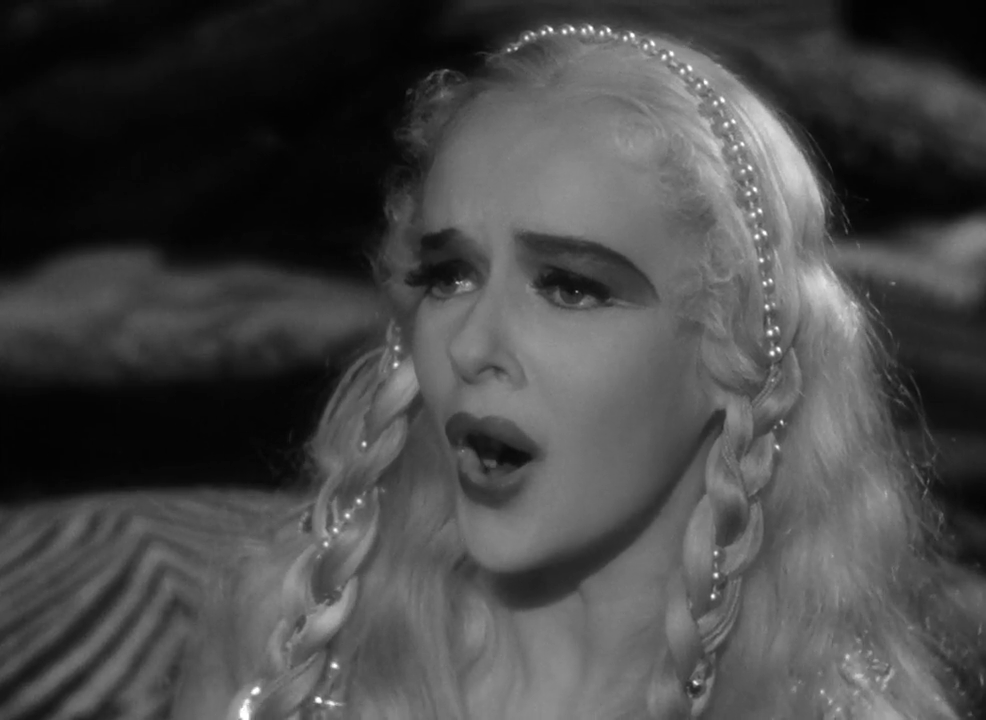

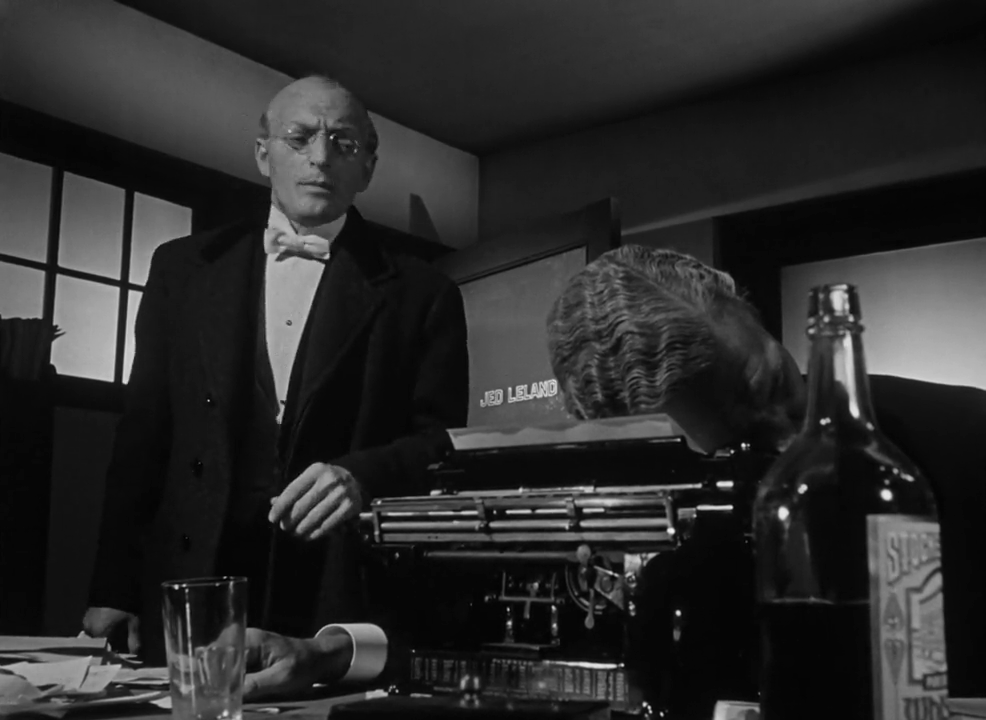
- Herman J. Mankiewicz and Welles’ Oscar-winning script
- Bernard Herrmann’s score
Must See?
Yes, of course, as a justifiable cult classic.
Categories
(Listed in 1001 Movies You Must See Before You Die)
Links:
|










3 thoughts on “Citizen Kane (1941)”
Count me as part of the admiring while not liking it camp. There is something about it that has kept me from really liking it. I have seen it several times and just rewatched it again, and I think I can say eureka, for me anyway.
It is technically brilliant, it’s a film clinic really, but it’s an aloof film and is only modestly entertaining. It’s a movie loaded to the gills with virtuosic flourishes, but feels as though it was meant to be admired more than absorbed and internalized, like an immaculate museum display. We are kept at a distance from everyone: from Kane, from our intrepid reporter, from the cavalcade of characters we’re introduced to. There’s no emotional investment in any one character in the movie, because the story never dwells long enough anywhere to allow any real attachment.
It takes way too long to get started. To get to the first scene with an adult Kane, you have to wait through a solid 25 minutes of news reel montage and backlit newsman chatter and masterful shot set-ups only to then get dribs and drabs of Kane through the eyes of witnesses to a reporter. I get it that the intention is to reveal Kane slowly and incompletely, but it’s an infuriating move. The net effect of the distance is that there’s no real gravity to Kane’s eventual downfall because we never cared for him to begin with. We had to strain ourselves to find some aspect of his character to relate to.
Danny Peary’s write-up in Cult Films lays out why he thinks it’s not only a masterpiece, but perhaps the greatest film ever made. I agree that it is a masterpiece, but on technical grounds. It belongs to film buffs and critics and film teachers and students while the casual viewer remains apathetic. Put it this way, if it truly is the greatest movie ever made, it accomplishes this feat despite the fact that mass audiences have largely ignored it. Its competitors for the title typically have considerable appeal saturation from the mass audience AND critics, not merely one of the two. As Peary pointed out, the critics are really the ones responsible for raising the status of the picture decades after it faded into relative obscurity.
Technique matters, composition matters, acting matters, but it’s film, and intuition and feel also matters. Pathos matters, and on this front, it feels so sterile. In all of that dense, meticulous packing of symbolism, expressionism, montage, and impressive deep focus shot set-ups, as Joseph Cotten’s Leland correctly points out that Kane never gave anything away. The same can be said of the movie, and despite Peary’s admiration for the slow-walked onion-peeling, I don’t think that that’s an asset in this case.
One of those films that as a young, budding film buff I tried to poo-poo and avoid because it’s the film all the stuffy oldster film buffs always hark on about; see the curmudgeonly UK critic Leslie Halliwell who seems to have had no time for any films made after about 1960.
But, when I finally sat down and saw the whole thing from beginning to end I had to eat humble pie and agree an absolute masterpiece; love it. Brilliantly made and hugely enjoyable.
No brainer must see.
A no-brainer must-see – and worthy of repeat viewings. As I decided to put it simply in ‘The ’40s-’50s in Film’ (fb):
“Y’know, Mr. Bernstein… if I hadn’t been really rich, I might’ve been a really great man.”
‘Citizen Kane’ (1941): An undisputed masterpiece, devised chiefly by Orson Welles, Herman J. Mankiewicz, (DP) Gregg Toland, (editor) Robert Wise and (composer) Bernard Herrmann – and performed by a stellar cast. It opens with the feeling of a horror story – and intermittently returns to that feeling. Essentially I suppose it *is* a horror story: a story of money, power and hubris.
Interesting article in ‘The Guardian’ in 2012:
https://www.theguardian.com/film/2012/jan/24/citizen-kane-screening-hearst-castle?fbclid=IwAR08o7tBTrQb6fFH9-7PMteQE2FPZIYSVthStJU1ditnKqY7RnPHD332l_E